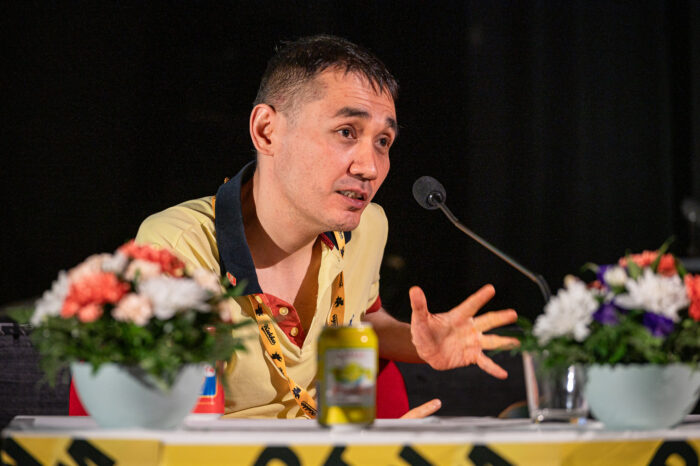The morning discussion held on Friday at 11 am welcomed the festival’s first guest from Kazakhstan, Adilkhan Jeržanov. Born in the copper town of Jezqazğan in 1982, the screenwriter-director-editor is one of the most notable filmmakers of the 21st century from his home country. He represents the so-called post-Soviet wave, and in the discussion he straightforwardly stated that he does not feel any kind of nostalgia for the Soviet period.
Jeržanov is known for his absurd style. With a twinkle in his eyes, he referred to his style as Kazakh caricatural realism. His aesthetic was influenced by his first movie experience; at the time, he was three years old and slept throughout most of the movie. Once he woke up, he realised that the movie had mixed with his dream in his mind. He had imagined the plot of the film in which the main character is looking for a woman. “Since then, cinema has meant to me that the protagonist is seeking something. Cinema is like a dream,” he said.
As a child Jeržanov was open to all kinds of movies. He tried to watch as many films as possible, because he was never sure if they would be banned. Jeržanov saw particularly many Bruce Lee movies, but he grew tired of the fight scenes in them. “I observed that movies need to have more than fights.”
Jeržanov is careful with violence in his film, and in real life does not agree with it at all. In movies it has to be shown with consideration and it should not be glorified. “Violence is disgusting and it has to be disgusting on the big screen too,” he states.
After the collapse of the Soviet Union and the death of his father, Jeržanov did not attend school continuously, so he self-studied when not in school. “Maybe if I attended school normally, I would make normal films.”
In his filmography, Jeržanov examines corruption and bureaucracy with humour. According to him, bureaucracy is a major problem in the ex-Soviet country of Kazakhstan. “If Kafka had seen all of this he wouldn’t have written anything about absurdism, because reality is absurd enough.”
Jeržanov also said that he was significantly influenced by Finnish director Aki Kaurismäki. According to him, he recognises the same constraint and rhythm in Kaurismäki films as in the people of Kazakhstan’s steppes. “I hold Kaurismäki’s films close to my heart. I have seen all of his films that I could get a hold of.”
Another favourite director of Jeržanov’s is Japanese Takeshi Kitano. He feels like both Kitano and Kaurismäki share the same reservation, and making you laugh when you are not supposed to. “Both directors are able to showcase well what is characteristic in their culture. When I am tired of the flow of movies, I rewatch their films time and time again.”
Jeržanov was also asked about his aesthetic and use of colour. He said he drew a lot of comics with a limited selection of coloured pencils as a child. It taught him about the importance of colour. “When I started to make movies, I realised that they are the same with comics. I moved from shot to shot. The structure is the same… Maybe that’s why there is something childlike in them”, he said.
In Jeržanov’s opinion, playfulness and imagination have an important role in the society, especially in difficult times: “The harder the reality, the more imagination matters. Sometimes I feel that the only thing that can conquer reality is imagination.”
Picture: Juho Liukkonen
